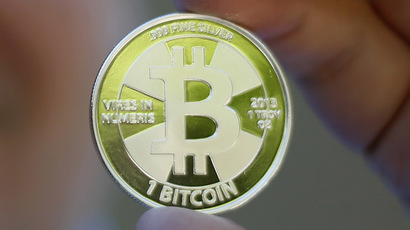‘Deep cold storage’ vault created for virtual currency bitcoin

A company in London has created a bank vault to cater for the virtual currency, bitcoin. The futuristic bank is offering so-called “deep cold storage” to protect the cyber money from hack attacks.
The idea of making a vault for a virtual company may seem absurd, but the creators of the Elliptic Vault in London claim they have cornered the market in bitcoin banking. They say their company is the “first in the world” to offer bitcoin owners insurance and protection from online theft.
At present, no form of insurance exists to cover the cyber currency, so once they are gone there is no way of retrieving them. In addition, a number of cyber-attacks have been reported on online bitcoin wallets. On October 26 an Australian bitcoin bank holding was ransacked in a cyber-attack that saw 4,100 bitcoins ($1.3 million) stolen.
Carelessness can also lead to the loss of bitcoins. UK citizen, James Howells, was left rooting through a landfill site after he threw away a hard drive containing $7.5 million worth of bitcoins in October.
The Elliptic Vault will use private encrypted keys to bitcoins which will be stored in offline servers. Each customer will be given a unique code with which they will be able to access their funds.
Marc Warne, the founder of the UK-based bitcoin purchase site, Bittylicious, told The Telegraph that the new vault would greatly benefit those with large bitcoin fortunes.
"Any such business that holds a significant amount of bitcoins can keep a proportion in insured cold storage. This can reassure investors and lenders that in the event of a disaster, the business can continue to operate," said Warne.
Bitcoin has created a stir around the world since its launch in 2009, with governments discussing how to legislate for the crypto-currency.
In November last year, the bitcoin currency passed the $1,000 mark for the first time in history.
However, it dropped below the $1,000 benchmark in mid-December after news from China that the country’s largest bitcoin exchange had halted operation due to a People’s Bank of China probe. The Chinese government was disturbed by the growing popularity of the currency and reports of its links to money laundering.
Moreover, in India the country’s largest bitcoin exchanged service halted operations at the end of December after the Reserve Bank of India warned users, holders and traders of virtual currencies, including bitcoins, about "potential financial, legal, customer protection and security related risks" they are exposing themselves to.
Currently there are more than 12 million bitcoins in circulation worldwide, which can be used to buy coffee, pay for online dating services, and can even be retrieved from an ATM. The currency’s value is determined by how much people are prepared to exchange for it.














